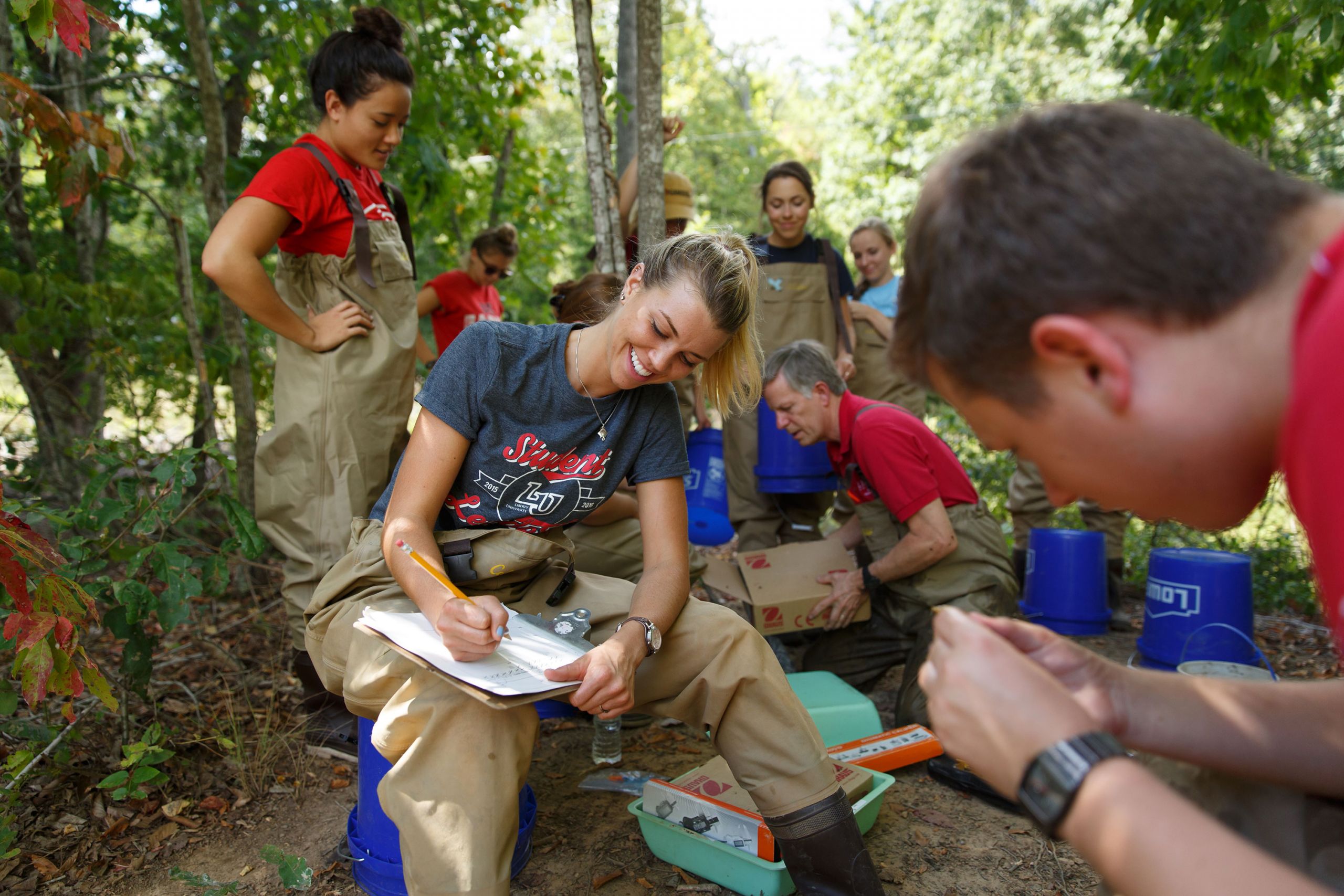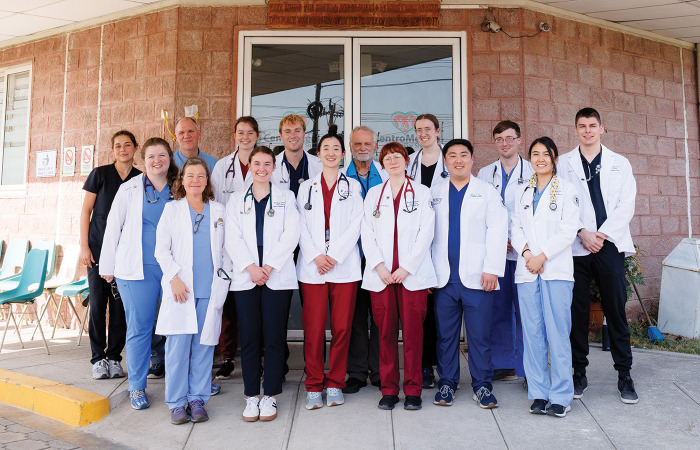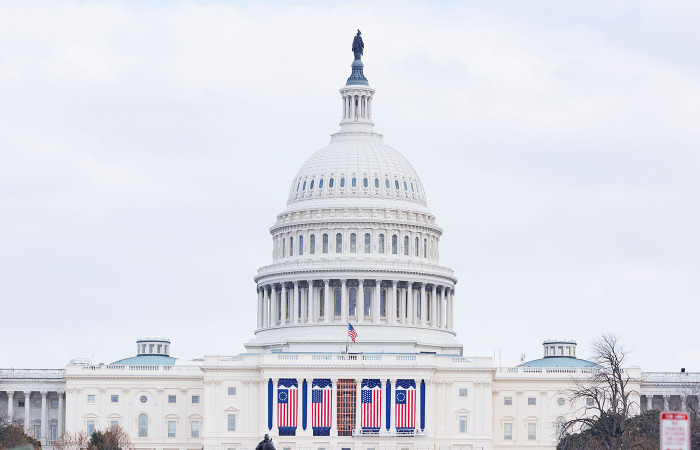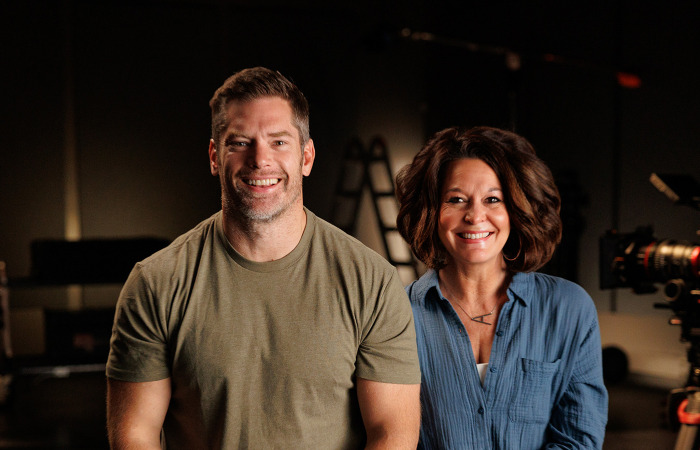From the tiniest cells invisible to the naked eye, to the tallest trees and largest creatures on earth, all of creation tells a story.
Science interprets this story, showing us how life began, how it goes on, and how to be responsible stewards of God’s handiwork. Liberty University’s Department of Biology & Chemistry is committed to equipping the next generation of scientists with the wisdom, skills, and experience they need to study, understand, and advance our knowledge of the living world.
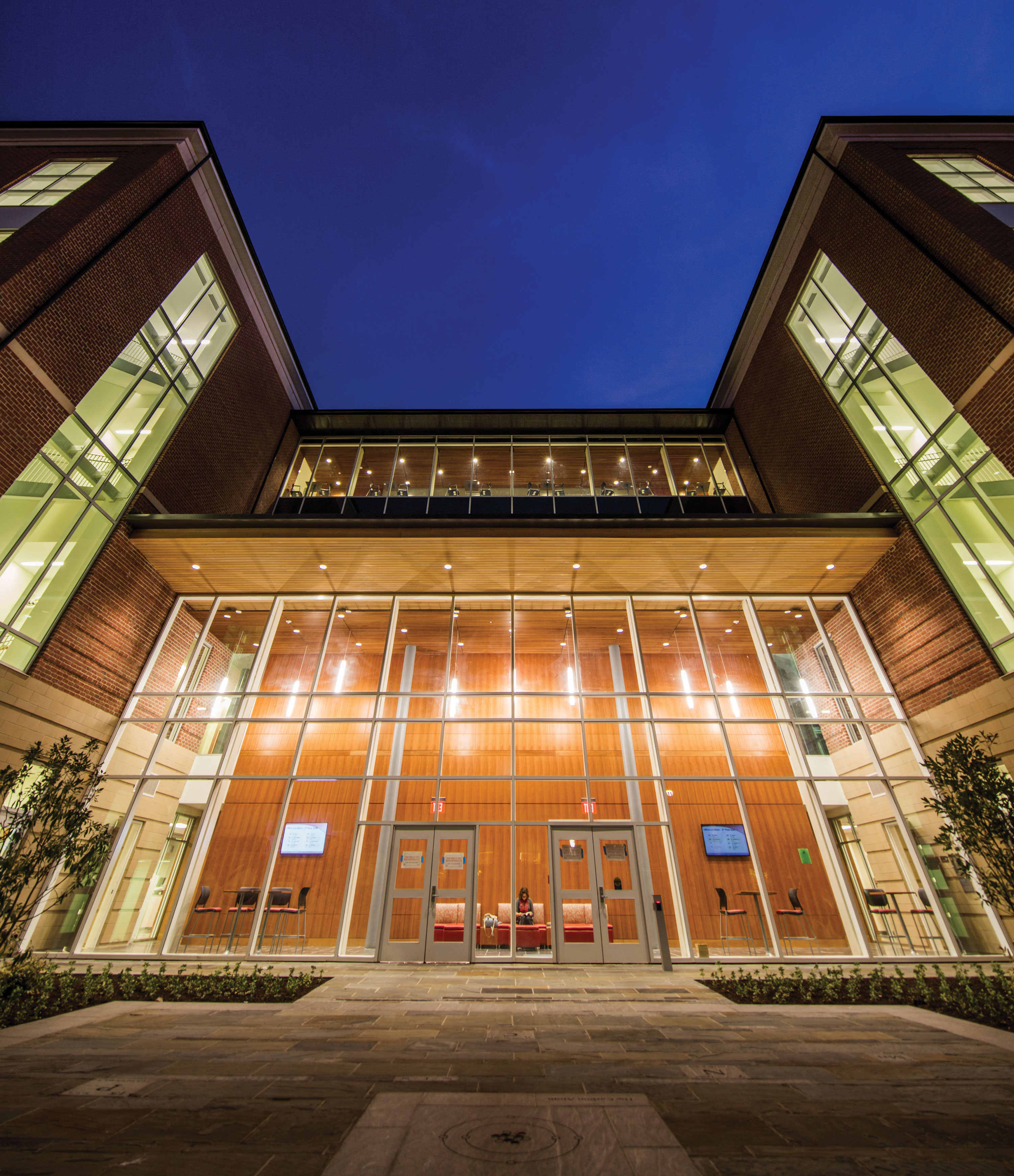
Liberty University’s new Science Hall is complete, allowing students to experience more research opportunities.
Exponential growth, cutting-edge research, diverse programs, and a new facility are making it possible for Liberty to train even more scientists in a variety of fields. In just five years, the biology and chemistry department has grown from two degree programs to 10 and has added a Master of Science in Biomedical Sciences. This program diversity gives students opportunities to specialize in areas such as zoo and wildlife biology, forensic science, pre-med, and more.
“If we are going to equip students to be stewards of God’s creation in all regards, including giving them experience in medicine or field research, we really have to run the gamut,” said Dr. David DeWitt, department chair.
The diversity of programs allows for interdisciplinary collaboration between specialists. Chemists can work with microbiologists to synthesize antimicrobial compounds, and environmental biologistscan work with molecular biologists to do genetic studies on organisms.
“You get a more holistic perspective of the living world when you integrate all of these areas,” DeWitt said. “We are not isolated in terms of our specializations.”
DeWitt credits the department’s growth to God and notes that the biblical perspective offered on science is an important — and attractive — factor for many students.
A permanent reminder of this perspective is literally etched in stone at the entrance to the new Science Hall: “‘In the beginning God created the heavens and the earth,’ Genesis 1:1.”
GROWTH
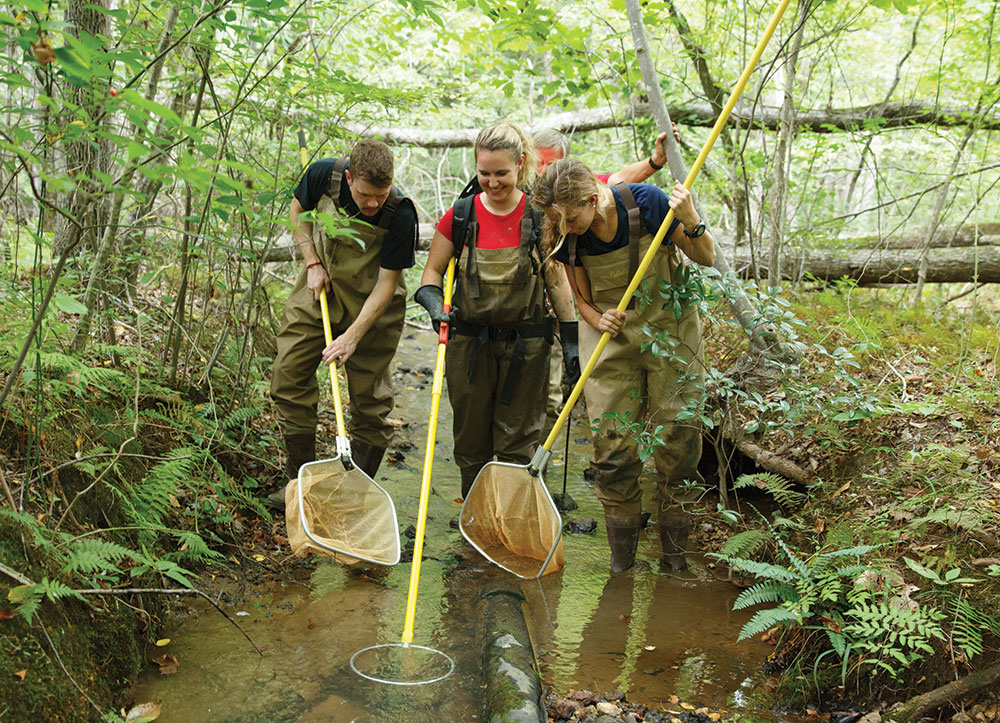
Ecology class students William Duffek (left), Maria Defosse, and Jessie Proehl capture and mark newts as part of a long-term population stability investigation during an ecology class project on Liberty’s mountain property.
Since 2010, the number of residential undergraduate biology and chemistry majors has grown from less than 600 to about 1,000. There are over 80 students enrolled in the Master of Science in Biomedical Sciences program, which offers one- and two-year tracks and is designed to give students a solid foundation in the sciences before going on to medical or dental school. Every member of the master’s program’s first graduating class in May was accepted into medical school.
Since joining the faculty in 1996, DeWitt has witnessed tremendous strides in more than just enrollment — facilities and equipment have also significantly improved. Standing in the new four-story, 121,000-square-foot Science Hall brings tears to his eyes.
“It is so emotional seeing the magnitude of improvement in terms of what we can offer the students,” DeWitt said. “A lot of effort went into the design of the building to consider convenience and safety and to provide real-world experience.”
The new Science Hall opened in part last spring and was completed this summer. It is triple the size of Liberty’s former science building, with significantly more lab space. Three floors are dedicated to the Department of Biology & Chemistry and one to the Department of Health Professions (both departments are under the School of Health Sciences). The building is outfitted with over $2 million in new equipment, including a gene sequencer, inverted phase microscope, high-speed centrifuge, atomic absorbance spectrometer, nuclear magnetic resonance spectrometer, and more. There also are over 20 spectrometers and 200 microscopes (including over 50 top-quality Zeiss microscopes) in the building.
Students have access to 20 biology and chemistry “wet” labs (where chemicals or biological matter are handled in liquid solutions), including a cell culture facility, several research labs, and additional open labs. Advanced HVAC systems reduce odors from chemicals and allow students to breathe fresh air.
The new building also includes a cadaver lab, forensic science lab, cold room (for biochemical procedures that require cold temperatures), plant/aquarium room, and a Creation Hall that displays fossils and other artifacts, presenting scientific evidence for a divine creator.
RESEARCH
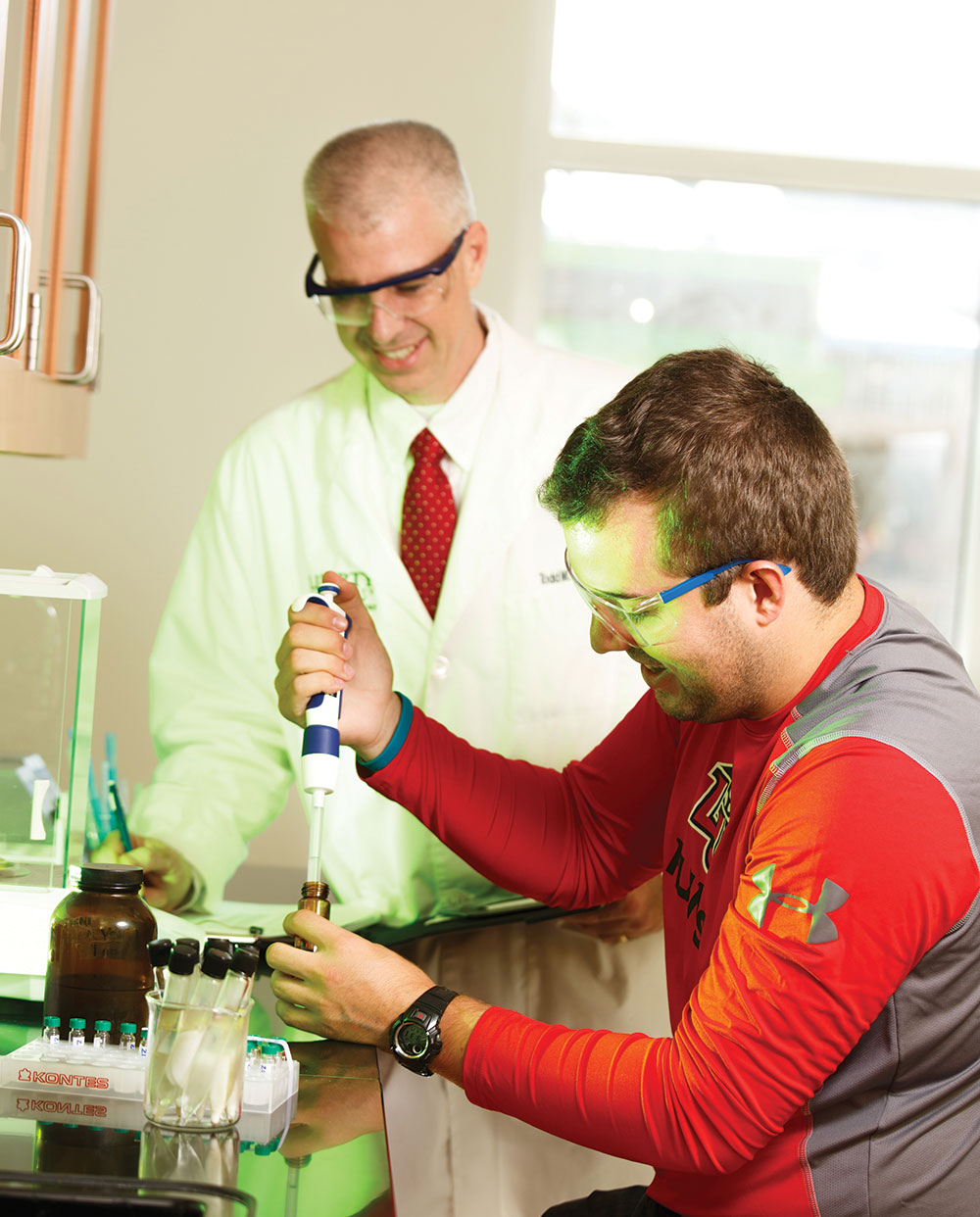
Dr. Todd Allen, director of chemistry, and Grant McClure, a senior biomedical sciences major/chemistry minor, analyze algae biofuel samples in a lab at the new Science Hall.
The new facility has also led to more research opportunities.
“When you are asking research questions,” Dewitt said, “you will ask questions within the framework and limitations of your resources. By moving to this facility with the equipment and resources we have now, the types of research that can be done have increased by orders of magnitude.”
The opportunities to study the living world at Liberty are as varied as the degree offerings. Current field and lab research includes forensic science, zebrafish breeding and embryonic development, salamander ecology in the nearby Peaks of Otter area, hawk migration, algae biofuels, fluorescent organic compounds, E. coli in the mammalian intestine, Alzheimer’s disease, MRSA, Lyme disease, and Cryptococcus (a fungus that causes illness). Much of this research could have a significant impact on the quality of life around the world — from helping to cure diseases to preserving ecosystems and producing cleaner fuels.
“There is a lot in biology and chemistry that can be done to improve quality of life across the board,” DeWitt said.
Research projects, such as the salamander study, have helped preserve wildlife populations in national parks and forests. Now that Liberty’s facility supports more involved research, students will have other unique opportunities, including assisting with forensic research on criminal cases.
These opportunities are putting the new equipment to good use. In May, Liberty researchers released their first draft genome sequence. Using the gene sequencer, a research team mapped the DNA sequence of a popular strain of E. coli bacteria, one that is being studied to learn how bacteria infects the gastrointestinal tract and leads to certain diseases.
Dr. Andrew Fabich, associate professor of microbiology, and Abigail Lenz (’14), a graduate assistant currently seeking her Master of Science in Biomedical Sciences, conducted the sequencing in collaboration with Dr. Jeffery Tomkins, an adjunct Liberty professor. The findings were published in “Genome Announcements,” an academic journal from the American Society for Microbiology.
“Publishing a draft genome will certainly raise the profile of Liberty University in regards to the kind of research we are doing,” DeWitt said. “A study like this really highlights the research involvement students can have with our faculty members.”
OPPORTUNITY
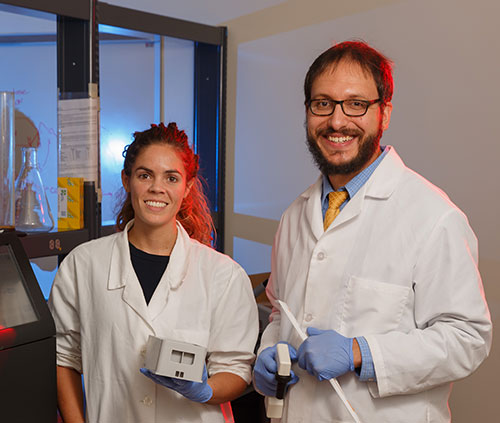
Dr. Andrew Fabich, associate professor of Biology, and graduate student Abigail Lenz published the university’s first draft genome sequence as part of their continuing research on E. coli in the mammalian intestine.
Abigail Lenz delayed going to medical school because of the tremendous opportunities Liberty afforded her to research disease. While visiting Africa as an undergrad, she saw firsthand the debilitating effects of the very disease her research may help cure one day. Lenz has always had a passion for science and a desire to help others, and her time as an undergraduate student at Liberty helped her discover that a career in medical research was a great fit for her.
Students like Lenz are able to thrive at Liberty because faculty, while being brilliant researchers, are committed foremost to investing in the next generation of scientists.
Most of the department’s faculty hold terminal degrees from prestigious institutions across the nation. They worked in some of the best laboratories and research facilities in the country before bringing their knowledge and experience to Liberty. And what they are doing is changing the model of education.
“What we do here is unlike anywhere else,” said Lenz’s mentor and research supervisor Dr. Andrew Fabich. “We have been everywhere else, and we know this is a unique experience.”
The educational experience at Liberty stands alone because undergraduate students are encouraged — and invited — to participate in research.
“Our focus is different,” DeWitt said. “Our faculty are here because they want to teach students. They are passionate about the research they are doing, but they are equally or more passionate about teaching the students. You don’t have professors with a ‘Don’t bother me; I am busy (doing my own research)’ mentality … it is a much different environment than at a lot of places.”
DeWitt said the program is entirely student focused.
“Although we have all this research being done, our faculty are involving undergraduate students, working with them side-by-side and equipping them to do scientific studies.”
Fabich said that research is the key to success in the sciences.
“You learn more when you spend that time at the bench answering research questions, because it forces you to apply what you have learned in the classroom,” he said. “Textbooks don’t have all the answers; you begin to see the way the world really works.”
Offering students more opportunities also improves their ability to think critically and ask questions. As a result, Liberty’s graduates are being accepted into top medical schools and consistently scoring well on MCATs (typically a 90-plus percent passage rate). They are stepping into labs, research facilities, and the field ready to contribute because of the experience they have gained at Liberty.
“It is overwhelming to see how far we’ve come,” DeWitt said. “And it is hard to say how much further we can go because it will be some time before the research reaches the level of the capabilities we have. We are so blessed. God is awesome.”
Awards and Accolades
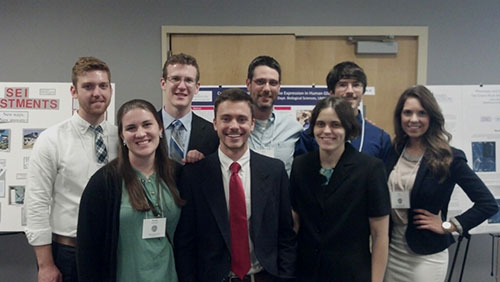
Dr. Gary Isaacs and his research team at the Virginia Academy of Science’s Annual Meeting: (front row, from left) Rachel Bordelon, John Arza, Amanda Hazy, Bria Johnston, (back row) Matthew Dalton, Nate MacGilvary, Isaacs, and John Lawson.
Liberty University students are being recognized in the scientific community for the quality of their research. In May, students received recognition at the Virginia Academy of Science’s Annual Meeting. Abigail Lenz (’14), who is currently seeking her Master of Science in Biomedical Sciences, received Liberty’s first graduate student award for her research in relation to the university’s first genome sequence (read more in the accompanying story). The award was especially significant considering it was the university’s first year to have a graduate program in biology.
Liberty also received two other awards at the conference. Amanda Hazy (’15) was awarded best undergraduate oral presentation, and John Arza and Nate MacGilvary (both current seniors) received an honorable mention for best poster presentation. Hazy, Arza, and MacGilvary’s research, studying Alzheimer’s disease models in mice, is supervised by Dr. Gary Isaacs. The study hopes to offer more insight into how the disease progresses in humans, leading to tests for early detection. (Hazy was the only candidate accepted this year for a dual doctoral program at Virginia Tech; she recently began her first year of a joint Doctor of Veterinary Medicine/Ph.D. program.)
This was the fourth year in a row that Liberty students have received awards for best poster or oral presentation in the biology/microbiology category, with Liberty’s undergraduate students outshining those (including graduate students) from other schools year after year. Last year, Isaacs received the prestigious J. Shelton Horsley award, the highest honor given by the academy for original research.
Joe Gosnell (’14), a graduate biomedical sciences student, was awarded a fellowship to the Third Annual Workshop on Metabolomics, held at the University of Alabama at Birmingham (UAB) in June. He was selected based on his drug development research that could prolong the time a Hepatic Fibrosis patient’s liver is able to function before a transplant becomes the only viable option.
Liberty’s students have also been awarded top honors at the Big South Undergraduate Research Symposium and the Undergraduate Research Symposium in the Chemical and Biological Sciences.
Two students, Abigail Lenz and Rebekah Betar, became the first in Liberty’s history to be accepted to present their research at the Interscience Conference of Antimicrobial Agents and Chemotherapy. After successfully completing a highly competitive application process, the graduate students were chosen to present in San Diego in September.
Degree Programs
Undergraduate
- Biochemistry & Molecular Biology
- Biomedical Sciences (Pre-Med)
- Biopsychology
- Cell & Molecular Biology
- Chemistry
- Environmental Biology
- Forensic Science
- General Biology
- Zoo & Wildlife Biology
- Zoology (including Pre-Vet)
Minors
- Minors in Biology & Chemistry
- Minor in Creation Studies
Graduate
- Biomedical Sciences (M.S.)
(Available both residentially & online)
Visit the department’s website for more information.
